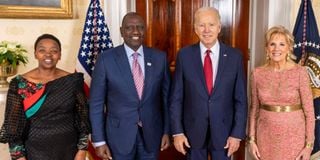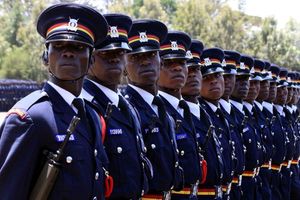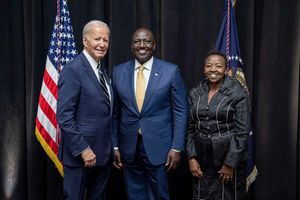
President Joe Biden and First Lady Jill Biden pose for photo line photos with President William Ruto and his wife Rachel during the U.S.-Africa Leader Summit, Wednesday, December 14, 2022, in the Diplomatic Reception Room of the White House.
Presidents William Ruto and Joe Biden lead countries 10,000km apart, but they both face domestic challenges:
A high cost of living in Kenya has been derailing Ruto’s famed bottom-up strategy, while a near-implosion over US management of the Gaza crisis has potentially distracted a re-election campaign for Biden.
This week, they will meet at the White House. And while Biden has hosted dozens of other world leaders over the past year, this will be the first time in nearly 21 years that a Kenyan leader is touring Washington in a State visit since President Mwai Kibaki’s trip on October 5, 2003.
It has excited officials in Nairobi, just as it has in Washington. Dr Korir Sing’oei, the Principal Secretary for Foreign Affairs, said the visit is an indication of the nature of relations. “It is a reflection of the position that Kenya is held within the United States and it represents a desire on both parties to deepen relations,” he argued in a preparatory briefing ahead of the trip, last week.
The visit, he argued, will offer both sides an opportunity “to curate partnership opportunities between Kenyan and American institutions”.
In an interview on Citizen TV, he listed the visit as a two part programme, first involving meetings with business leaders and then bilateral talks with his host. Part of the tour includes a visit to Atlanta, Georgia, where the President will be at the CDC headquarters as well as the Tyler Perry Studios, producers of the famed ‘Madea’ comic movies, as well as discussions with Coca-Cola chiefs.
Nairobi says the beverage maker has pledged to invest over $200 million in the country, although officials didn’t immediately clarify on timelines. President Ruto said last month the trip is business-oriented, targeting trade and investment.
It will coincide with a seven-day commercial exhibition in Atlanta, in a move to woo US investors.Kenya plans to pitch more than 30 bankable projects worth over $20.5 billion during the business exhibition, dubbed, “Make it Kenya”, where over 30 Kenyan exhibitors have confirmed participation, between May 19 and 26, according to Trade Cabinet Secretary Rebecca Miano.
“The delegation will leverage on the visit to promote Kenyan goods and services with a view of elevating the profile of Kenya as a source of quality goods and services,” she told The Weekly Review.
That, and the idea that Kenya is “an attractive destination for inward foreign direct investments (FDI) from the US through bankable investment opportunities,” should help President Ruto’s economic strategy, she added. But the trip is more than just transactions.
It could reflect on the overall US-Africa policy, considering that Biden did not honour his promise to visit Africa during his term and now faces uncertainty on reelection. In August 2022, Washington publicised US Strategy Toward Sub-Saharan Africa, calling it a “new approach” to relations and promising to emphasise on issues that “will further embed Africa’s position in shaping our shared future.”
The strategy, however, retained old priorities, including fostering open societies, delivering democratic dividends, advancing economies, supporting climate adaptation and transition to cleaner energies.Two years later, the US popularity in Africa has tailed China’s. According to a Gallup Poll released last month, China recorded its highest leadership approval rating in Africa in a decade, earning 58 per cent against 56 per cent of the US.
Washington had been more influential in Africa for most years since 2007, except 2006 and 2019.
That rivalry, Gallup Poll indicated, is centred “on many geopolitical issues, including a race to secure access to precious minerals and disputes over debt relief”. Approval ratings for the US fell sharply, especially in its key allies such as Uganda (63 to 34), Gambia (50 to 29) and Kenya (73 to 59). Nonetheless, Kenya’s rating of the US remained high. Bilaterally though, the trip is both a political opportunity just as it offers business avenues, some experts think.
“Biden’s policy on Africa has been lagging behind as other global players like China, Russia, Turkey, India, Qatar and Saudi Arabia, strengthen relations with the continent and replace Washington in many political, diplomatic, economic and security spaces in the continent.Biden is playing catch up,” David Monda, a professor of Political Science at the City University of New York, told The Weekly Review.
“In addition to this, Biden is losing support among the African-American voting constituency in part due to unfavourable decisions he has made in foreign policy. This visit is a way to shore up Biden’s base in the run-up to the November 2024 elections,” he said.
For Ruto, that raises his profile as a continental leader in crucial areas such as technology, security, democracy and political issues as well as climate change, giving it an ‘anchor role’ in a region now troubled with conflicts, Prof Monda added.
“It will highlight Kenya as a strategic hub for technological innovation to address the climate crisis in follow up to the Nairobi Declaration and the Biden Administration's $1 billion Green Climate Fund (GCF) to support developing nations,” he said referring to the document published after the Africa Climate Summit last year in September in Nairobi.
There could be other areas of focus, such as extending discussions from the US-Africa Summit of 2022 and finalising deployment of Kenyan police to Haiti under a Multilateral Security Support Mission (MSS).
Endorsed by the UN Security Council, MSS is being bankrolled by Washington to a tune of $300 million.
Nairobi agreed to deploy 1,000 officers but has faced legal hurdles. There are risks in getting carried away, however. And some experts say Kenya must jot down its needs and tick them as the trip progresses.
“Kenya must push to conclude the talks (on trade) and have in place a watertight agreement that transcends administrations,” said Nasong’o Muliro, a researcher on Foreign Policy and Security at the Global Centre for Policy and Strategy, a think-tank in Nairobi.
He was referring to ongoing trade negotiations between Washington and Nairobi. Biden’s predecessor, Donald Trump, had started talks for a Free Trade Agreement but Biden halted the talks and launched a new version. “Whereas Kenya-US security relations have been on a crescendo, the economic aspect has not advanced in tandem.
The US considers Kenya a core state in its geo-security interests in the region. So, President Ruto should leverage on US security interests and pressures in the Horn and Eastern region to push for greater economic dividends,” Nasong’o told The Weekly Review.
That should involve focusing on job creation, foreign direct investments, technological transfer and supporting Kenya to emerge as a continental front runner in digital leap, he argued.
Most of that won’t be met if Americans don’t see their interest in it though. So some experts are advising that Kenya begins by pushing for more people-to-people relations, including easier visa restrictions, especially for students.
Ruto was the only African head of state to receive a phone call from Biden, somewhat reflecting the distraction Washington has faced in dealing with global crises away from Africa.
While Nairobi has enjoyed recent visitations from high-level officials from Washington, Prof Monda cautioned that Kenya faces one more risk:
A dilemma on running its own foreign policy.
“Aligning too closely with the West, like Kenya did during the Cold War, denies the country strategic autonomy, that is, the ability of Kenya to react to international affairs in a manner centred only on its core interests and not being overly sensitive to the West,” he said. “Kenya constantly has to factor in the reactions of the West.
Hence the challenge of President Ruto looking like Washington’s errand boy. The proposed deployment of Kenyan troops to Haiti is a case in point.” Not being in control of own foreign policy may also hurt the very pan-African credentials Ruto says he pursues, Monda says.









